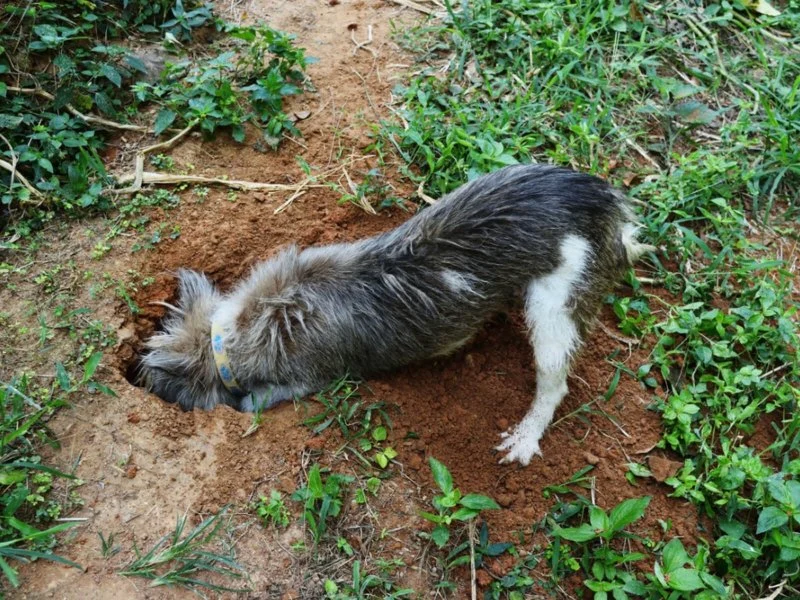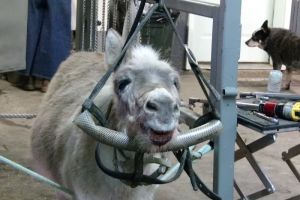
- 1- Understanding Pet Digging Behavior
- 2- Why Do Pets Dig? Common Causes
- 3- How to Stop Digging in the Yard
- 4- How to Stop Digging Indoors
- 5- Additional Tips for Preventing Digging Behavior
1. Understanding Pet Digging Behavior
Pet digging is a common behavior, especially among dogs, but it can be frustrating for pet owners. Whether your dog is digging up your garden, scratching up the carpets, or trying to escape from the yard, understanding the cause of this behavior is the first step to resolving it. Digging can be both a natural instinct and a response to boredom or anxiety.
In this article, we’ll explore why pets dig and offer practical tips on how to stop them from digging both indoors and in your yard. By addressing the root causes of the digging behavior, you can help your pet engage in healthier activities while keeping your space intact.
2. Why Do Pets Dig? Common Causes
Understanding why pets dig is key to addressing the problem. Here are the most common reasons behind digging behavior:
- Instinctual Behavior: Many dogs, especially terriers, have a natural instinct to dig. They dig to hunt for prey, create a cool or warm spot to rest, or to bury food and toys.
- Boredom or Lack of Exercise: Dogs that don’t get enough physical activity or mental stimulation may dig as a way to entertain themselves. A lack of exercise can lead to excessive energy, which often results in unwanted digging behavior.
- Separation Anxiety: Dogs that experience anxiety when left alone may dig to relieve stress or escape their confined spaces. This type of digging often occurs near doors or windows where the dog tries to dig its way out.
- Seeking Comfort: Sometimes, dogs dig to create a comfortable spot to lie down. In hot weather, they might dig to uncover cooler earth, and in cold weather, they may dig to burrow and warm up.
- Attention-Seeking: If a dog has learned that digging gets attention, they may continue the behavior simply to gain the attention of their owners, even if it’s negative attention.
Identifying the root cause of your pet’s digging behavior is crucial before you can successfully stop it. Each cause requires a different approach to prevention.
3. How to Stop Digging in the Yard
When it comes to outdoor digging, your pet may be digging to escape, seek shade, or simply out of boredom. Here are some effective tips for stopping digging in your yard:
- Provide a Designated Digging Area: If your pet enjoys digging, consider creating a designated area where they can dig freely, such as a sandbox. This can satisfy their natural instinct and prevent them from digging in other areas of your yard.
- Increase Exercise and Playtime: Regular physical activity can reduce boredom and excess energy. Engage your dog in walks, runs, or interactive playtime to prevent them from digging out of frustration.
- Use Dig-Proof Fencing: If your pet is digging to escape, reinforcing your fencing or installing a “dig guard” along the bottom of the fence can deter them from burrowing under it.
- Fill the Holes: Filling in the holes with rocks or chicken wire can discourage pets from digging in those spots. Some pet owners recommend sprinkling citrus peels or strong-smelling substances around the yard, as pets often dislike these scents.
- Supervision and Training: Supervise your pet while outdoors, and use positive reinforcement to reward good behavior. Redirect them when they start digging, and encourage them to engage in other activities like playing with toys.
4. How to Stop Digging Indoors
Indoor digging, whether it’s on furniture, carpets, or bedding, can also be a common issue, particularly if your dog is anxious or trying to create a comfortable space. Here are some tips for addressing digging indoors:
- Provide a Comfortable Sleeping Area: Ensure your pet has a comfortable and designated sleeping area, like a plush dog bed or crate, so they aren’t tempted to dig in other spots.
- Provide Interactive Toys: Interactive toys can keep your pet mentally stimulated and distracted. Puzzle feeders, chew toys, and treat-dispensing toys can help reduce indoor digging.
- Reassure and Calm Your Pet: If the digging is caused by anxiety, especially separation anxiety, consider using calming aids such as anxiety wraps or pheromone sprays. Training your dog to stay calm when you leave the house is also crucial.
- Increase Engagement: Spend quality time with your pet indoors, especially if they are left alone often. Indoor play sessions, training, and bonding time can help reduce stress and distract your pet from digging.
5. Additional Tips for Preventing Digging Behavior
Here are some additional general tips that can help prevent digging behavior in both the yard and indoors:
- Spay or Neuter Your Pet: Spaying or neutering your pet can help reduce certain hormonal behaviors, including digging.
- Provide Mental Stimulation: Mental stimulation is just as important as physical activity. Training sessions, puzzle toys, and regular challenges can keep your pet’s mind engaged and reduce boredom-driven digging.
- Visit a Veterinarian: If your pet’s digging behavior seems to be related to a medical condition, consult with a veterinarian. Sometimes excessive digging can be a symptom of pain, discomfort, or other health issues.
By understanding the causes of your pet’s digging and implementing these strategies, you can create a more peaceful and comfortable living space for both you and your pet.









 Shiloh Animal Hospital4.0 (425 reviews)
Shiloh Animal Hospital4.0 (425 reviews) Michael D. Wall DVM4.0 (54 reviews)
Michael D. Wall DVM4.0 (54 reviews) Cummins John R DVM4.0 (10 reviews)
Cummins John R DVM4.0 (10 reviews) Frankfort Veterinary Clinic4.0 (195 reviews)
Frankfort Veterinary Clinic4.0 (195 reviews) The Economic Veterinary Initiative (EVI spay/neuter clinic)4.0 (67 reviews)
The Economic Veterinary Initiative (EVI spay/neuter clinic)4.0 (67 reviews) PetVet Vaccination Clinic0.0 (0 reviews)
PetVet Vaccination Clinic0.0 (0 reviews) How to Recognize Lice or Mites in Pets: A Guide for Pet Owners
How to Recognize Lice or Mites in Pets: A Guide for Pet Owners Natural Remedies vs Vet Treatments: Making the Right Choice for Your Pet
Natural Remedies vs Vet Treatments: Making the Right Choice for Your Pet DIY Frozen Treats for Pets: Recipes & Safety Tips
DIY Frozen Treats for Pets: Recipes & Safety Tips Remote Monitoring of Chronic Illness in Pets: A New Era in Pet Healthcare
Remote Monitoring of Chronic Illness in Pets: A New Era in Pet Healthcare How to Re-Train a Rescue Dog with Unknown History: Tips and Techniques
How to Re-Train a Rescue Dog with Unknown History: Tips and Techniques How to Save Money on Pet Medical Costs Without Cutting Quality
How to Save Money on Pet Medical Costs Without Cutting Quality